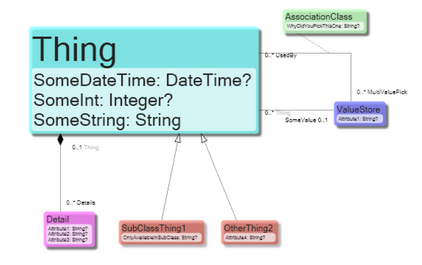OCLOperators allInstances
No edit summary |
No edit summary |
||
| (9 intermediate revisions by 4 users not shown) | |||
| Line 1: | Line 1: | ||
<message>Write the content here to display this box</message> | |||
=== allInstances () : Set{T} === | === allInstances () : Set{T} === | ||
Returns a Set containing all of the existing instances of the current classifier (along with instances of all its inherited classifiers). | Returns a Set containing all of the existing instances of the current classifier (along with instances of all its inherited classifiers). | ||
| Line 5: | Line 6: | ||
!Result | !Result | ||
|- | |- | ||
| | |Thing.allInstances | ||
| | |all the Thing object instances currently in your system - if only in DB objects will be loaded | ||
|} | |} | ||
Your model is central to all expressions you will handle. We will use this model for the examples: | Your model is central to all expressions you will handle. We will use this model for the examples: | ||
[[File:Allinstances operator.png|frameless| | [[File:Allinstances operator.png|frameless|422x422px]] | ||
{| class="wikitable" | {| class="wikitable" | ||
!Operators | !Operators | ||
| Line 39: | Line 40: | ||
|Filtering on Specialization is done with an operator SafeCast. This is null safe so for all objects that do not fit the profile the expression returns false | |Filtering on Specialization is done with an operator SafeCast. This is null safe so for all objects that do not fit the profile the expression returns false | ||
|} | |} | ||
[[ | This was a description of the <code><span class="col-black">'''allinstances'''</span></code> operator. It is a common operator. To find all available operators, you can open the OCL Editor and type in a class. | ||
'''See:''' [[Documentation:OCLOperators|OCLOperators]] | |||
[[Category:OCL General Operators]] | [[Category:OCL General Operators]] | ||
{{Edited|July|12|2025}} | |||
Latest revision as of 05:31, 18 March 2025
This page was created by Alexandra on 2017-08-08. Last edited by Stephanie@mdriven.net on 2025-03-18.
allInstances () : Set{T}
Returns a Set containing all of the existing instances of the current classifier (along with instances of all its inherited classifiers).
| Expression | Result |
|---|---|
| Thing.allInstances | all the Thing object instances currently in your system - if only in DB objects will be loaded |
Your model is central to all expressions you will handle. We will use this model for the examples:
| Operators | Description |
|---|---|
| Thing.allinstances | Gives you a list of all things |
| Things.allinstances->select(someInt>3) | Only things with someInt bigger than 3 |
| Thing.allinstances->select( (someInt>3) and (someInt<6)) | Only things with someInt bigger than 3 but less than 6. Notice the extra parenthesis to or the Boolean expressions together |
| Things.allinstances->select(x|x.someInt>3) | Here we introduce the loop variable x. We separate the definition of x from the usage of x with the pipe sign “|”. Loop variables are optional but if names are unique – but you will need to use them to give precision or to if you want to perform operations on the loop context itself. |
| Things.allinstances.Details | Gives a list of all Detail objects that are connected to a Thing. The Detail objects that float around without a Thing will not be on the list |
| Things.allinstances.Details.Attribute1 | A list of nullable strings from the contents of the details attribute1. Note that OCL is null-tolerant – you do not need to check if the Details exist or not – the language handles null checks for you. |
| SubClassThing1.allinstances.Details | Inherited features of classes are directly accessible |
| Thing.allInstances- >select(x|x.safeCast(SubClassThing1). OnlyAvailableInSubClass='Hello') | Filtering on Specialization is done with an operator SafeCast. This is null safe so for all objects that do not fit the profile the expression returns false |
This was a description of the allinstances operator. It is a common operator. To find all available operators, you can open the OCL Editor and type in a class.
See: OCLOperators

